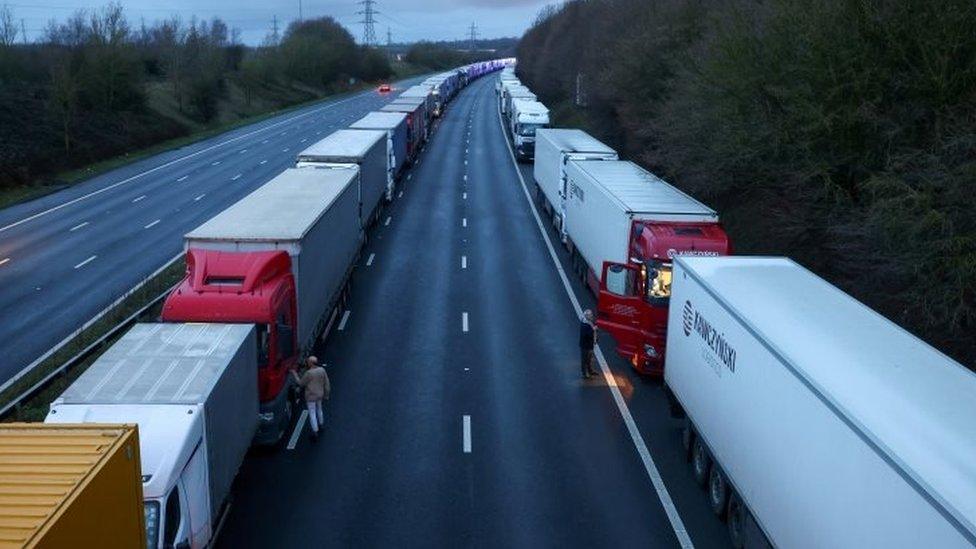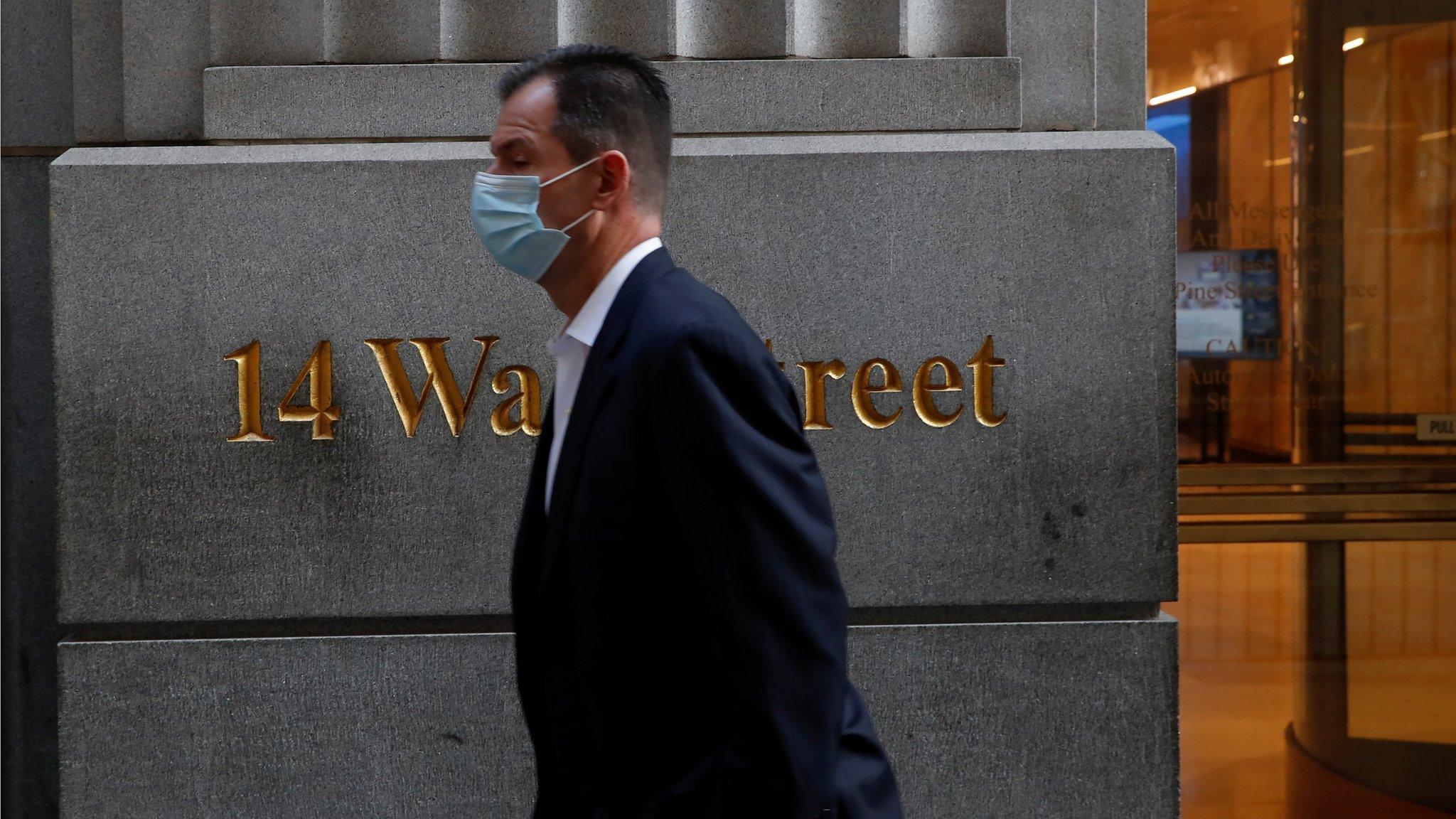Coronavirus: EU urges countries to lift UK travel bans
- Published
- comments
1,500 lorries stuck in Kent as France remains closed
The EU's executive branch, the European Commission, has called on member states to lift travel bans imposed against the UK amid fears of a new Covid strain.
The non-binding recommendation was put forward ahead of a meeting of ambassadors from the 27-member bloc.
But with EU countries free to set their own rules on border controls they may continue with their own policies.
France and the UK meanwhile said they had reached an agreement to ease restrictions.
At the weekend, France closed its borders to passengers and freight from the UK, causing disruption at the southern British port of Dover, an important gateway for goods entering and leaving the UK.
Thousands of lorries have become stuck, prompting warnings of shortages over Christmas.
The EU meets - but no sign of a common policy
Almost all the EU's 27 member states are currently blocking travellers from the UK.
Keen to develop a common policy, after earlier in the year seeing members close shared borders, the EU has been holding emergency meetings.
In a statement, the commission recommended its members allow people to travel to their country of residence providing they take a Covid-19 test or self-isolate. But it said non-essential travel should be discouraged.
It also said transport staff in the EU, such as lorry drivers, should be exempt from travel restrictions and mandatory testing.
'Operation Brock' in place for lorry drivers
On the UK, it said that should lorry drivers require Covid-19 tests to leave the UK for France and other EU countries, it "should not lead to transport disruptions".
But as Tuesday came to a close there was little sign that the recommendation would be taken up. Some flights will resume on Wednesday for Belgian nationals returning home but Germany extended its ban.
One diplomat told the AFP news agency that the ambassadors had simply "taken note" of the recommendation.
What's the situation between France and the UK?
The deal will allow the resumption of freight and some passenger services through the UK-French border.
Lorry drivers and EU nationals will be able to travel but must show proof of a negative coronavirus test.
Plane, boat and Eurostar train connections will resume on Wednesday.
Since the border closure began nearly 3,000 lorries have been stuck in southern England and it is likely to take until Christmas for the situation to be resolved.

The French restrictions have led to long queues forming in southern England
The UK government is advising lorry drivers against travelling to the area until mass testing gets under way.
Meanwhile, Japanese car giant Toyota said it had suspended production in two factories in the UK and one in France. It blamed "shortages of parts due to transport delays and the uncertain nature of the duration of the border closures".
Is anyone else banning UK arrivals?
UK travellers don't just face restrictions in Europe - more than 50 countries around the world from India, to Iran, to Canada have suspended flights from the UK.
The US already has restrictions in place that prevent most non-US citizens who have been in the UK and some other countries for the last 14 days from entering. It is yet to follow suit with a ban on all travellers from the UK, but two airlines - British Airways and Delta - will only allow passengers who test negative for the coronavirus to fly to New York's John F Kennedy airport.
Saudi Arabia, Kuwait and Oman have shut their borders completely to international passengers.
Sweden banned foreign travellers from Denmark overnight into Tuesday after cases were discovered there. The decision alarmed Danes - especially those on the island of Bornholm, which relies on a fast ferry link with Ystad in Sweden. There are fears that many will struggle to get to or from Bornholm in time for Christmas, Danish media report.
Along with Denmark, the new strain has also been detected in Australia, Italy and the Netherlands.
Mr Johnson said he understood the concerns of "our international friends"
As the list of countries imposing travel restrictions on the UK grew, the World Health Organization's (WHO) Europe director, Hans Kluge, said member states would convene to discuss strategies and limit travel, while maintaining trade.
The new strain is more transmissible but is not more deadly or resistant to vaccines, experts say.
Some experts believe the new strain has already spread beyond where it has been reported, crediting the UK's use of genomic surveillance for detecting it.
"I think we will find in the coming days that a lot of other countries will find it," Marc Van Ranst, a virologist from the Rega Institute for Medical Research in Belgium, told broadcaster VRT.
In another development, travellers from South Africa are also facing bars from some countries after another new variant of the virus was discovered that is unrelated to the one found in the UK.

How are the new restrictions affecting you? Share your experiences by emailing haveyoursay@bbc.co.uk, external.
Please include a contact number if you are willing to speak to a BBC journalist. You can also get in touch in the following ways:
WhatsApp: +44 7756 165803
Tweet: @BBC_HaveYourSay, external
Please read our terms & conditions and privacy policy
If you are reading this page and can't see the form you will need to visit the mobile version of the BBC website to submit your question or comment or you can email us at HaveYourSay@bbc.co.uk, external. Please include your name, age and location with any submission.
- Published21 December 2020

- Published15 December 2020

- Published21 December 2020

- Published5 July 2022
